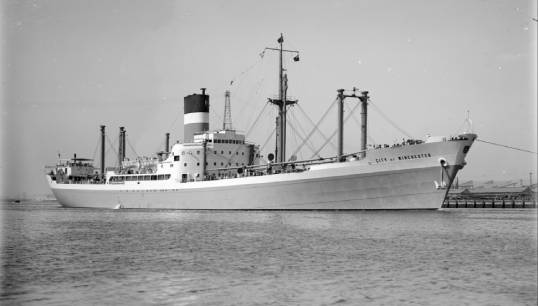City of Winchester

Explore
Post-war rebuild
Ellerman had been one of the biggest UK shipping companies before the Second World War but lost more than half its fleet during the conflict. In 1945 it rapidly began an ambitious programme to not only rebuild its fleet but also to focus on the development of deepsea trade to North America, Australasia and the Middle East.
By 1952 Ellerman had taken delivery of 45 new ships, taking its fleet to almost pre-war levels, and City of Winchester – which was built at the William Denny yard in Dumbarton – was the second of two sisters designed for the group’s Australian services. The other vessel, City of Brisbane, had come into service in 1951 after being completed at the Cammell Laird yard in Birkenhead.
Deployments
Easily recognised by their prominent funnels, the ships were each powered by three sets of double-reduction geared steam turbines, giving a service speed of 17.5 knots, and spent much of their time on the Montreal-Australia-New Zealand service – a run which was popular with their crews of more than 90 seafarers.
Ben Line Containers
As containerisation began to develop during the 1960s, Ellerman became a founder member of the ACT consortium of British shipping companies and also built an increasingly close relationship with the Scottish company Ben Line, jointly establishing Ben Line Containers in 1970. In the same year Ben Line – which had already bought some ships from Ellerman to deal with the impact of the closure of the Suez Canal and the consequent longer voyages around the Cape – purchased both City of Winchester and City of Brisbane after Ellerman agreed to pool its Far East services with Ben Line.
City of Winchester was renamed Benvannoch and City of Brisbane became Bencairn, with the ships running on Ben Line Steamers’ Far East trades. When the Suez Canal reopened in 1975 shipping operations underwent widescale rationalisation and, with container services proving a much more attractive economic proposition than general cargo ships, Ben Line accelerated the disposal of its conventional tonnage and both City of Winchester and City of Brisbane were sent for scrapping in Kaohsiung.
Image: State Library of Victoria
City of Winchester Fact File
How much did City of Winchester weigh?
City of Winchester had a grt of 10,594.
How long was City of Winchester?
City of Winchester was 568 ft (173m) loa.
How powerful was City of Winchester?
City of Winchester was powered by three steam turbines developing 14,300shp
Contribute
Are you knowledgeable about this vessel?
Submit your contribution to this article to our editorial team.
Write to usView more ships of the past
HMS Beagle
Launched 200 years ago, HMS Beagle has been described as one of the most important ships in history – thanks to the observations on evolution and natural selection that its famous passenger Charles Darwin made during a five-year voyage around the world between 1831 and 1836.
Common.ReadMoreHMS Beagle
Hero
The 1977 loss of the UK-flagged ferry Hero in the North Sea sparked Union concerns over the safety of ro-ro ships a decade before the Herald of Free Enterprise disaster.
Common.ReadMoreHero
Ruahine
Entering into service just over 70 years ago, the Ruahine was the last passenger-carrying ship built for the New Zealand Shipping Company (NZSC), and the third to bear the name – which means 'wise woman' in Māori.
Common.ReadMore